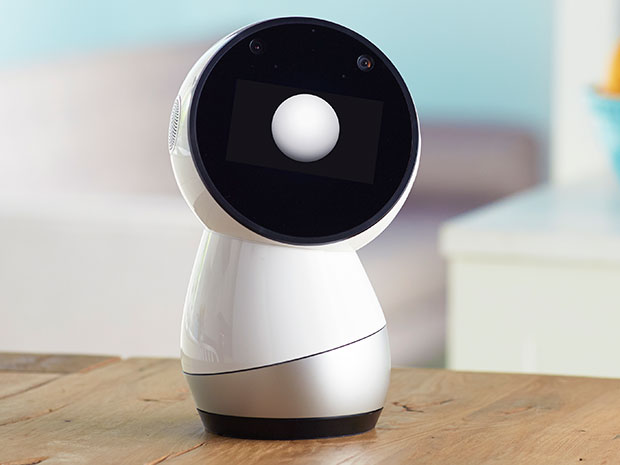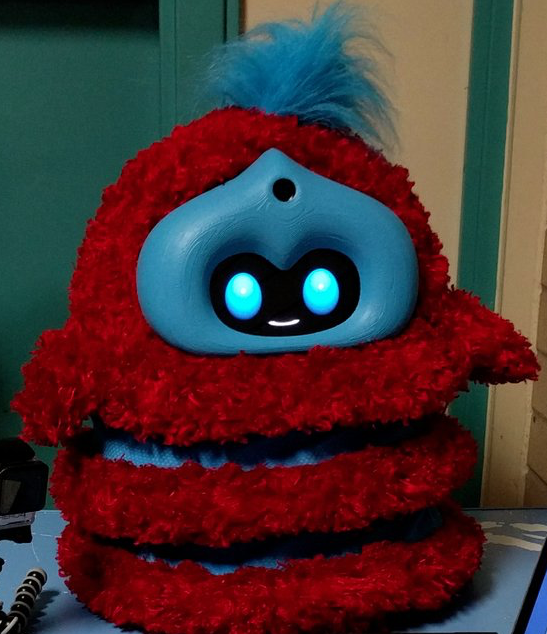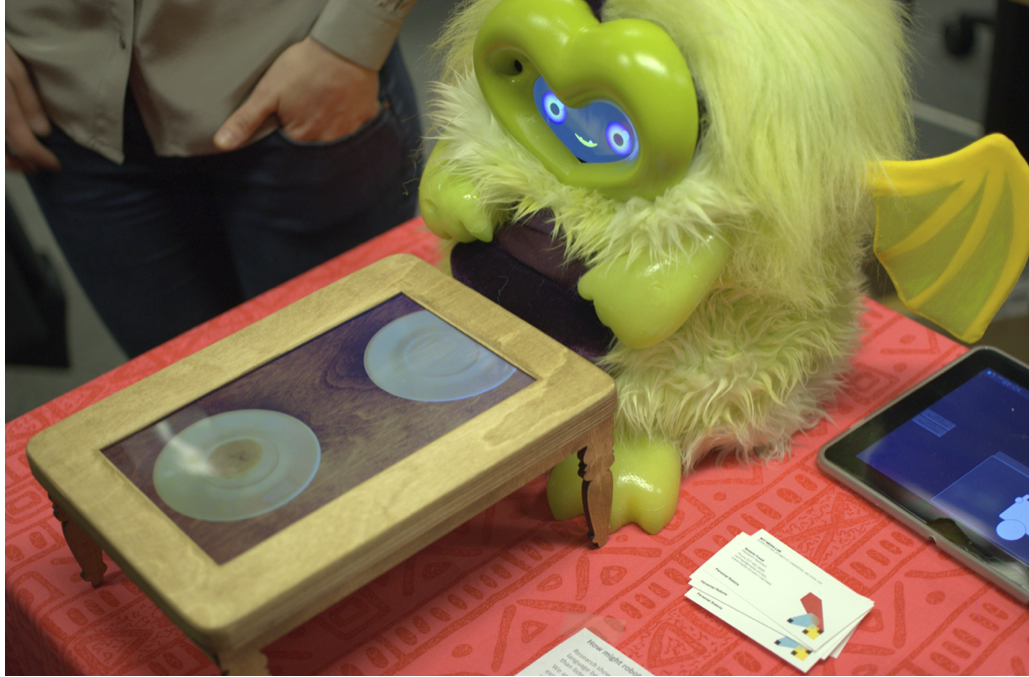Research
Highlights
(For a full list of publications see below or go to Google Scholar)

Transferrable, continual personalization models for interactive robot tutors
Recognizing that language learning requires engaging students cognitively, affectively, and socially, this project advances work to design adaptive, personalized models of students over time and across tasks. We apply adaptive student personalization algorithms within a suite of custom-designed games for promoting young children language and literacy skills, extending the scope of single-task “long-term personalization” methods to “multi-task personalized” interactions, which occur across different task contexts. With continual learning methods that can model individuals over time and across tasks to improve model efficiency and student learning gains, we call this combined approach “Lifelong Personalization”.
Selected Publications:.
Lifelong Personalization via Gaussian Process Modeling for Long-Term HRI Frontiers in AI & Robotics
Towards Transferrable Personalized Student Models in Educational Games AAMAS 2021
A Social Robot System for Modeling Children’s Word Pronunciation AAMAS 2018

Robots that can sense and understand human emotion to build better models and interact more empathically with children.
Human affective responses carry important signals for social interaction. In this series of projects, we developed “affect-aware” robots that sense, interpret, and incorporate affective signals into personalization algorithms for interactive storytelling. In partnership with local schools, we deployed these robots in classrooms and were showed that using affective signal data can improve student engagement, model inference, and student learning gains over time. This project also introduces guidelines and techniques for successful interpretation and use of affective data in interactive robot tutors.
Selected Publications:.
Frustratingly Easy Personalization for Real-time Affect Interpretation of Facial Expression ACII 2019
Affect-Aware Student Models for Robot Tutors AAMAS 2016
Affective Personalization of a Social Robot Tutor for Children’s Second Language Skills AAAI 2016
AAAI Spotlight Video Overview here

Using Learning from Demonstration (LfD) to create autonomous behavior policies for social interaction tasks.
Learning from Demonstration (LfD) is a popular and effective method for developing robot behaviors. Thus far, LfD has been most effective in producing physical, task-oriented behaviors (e.g. manipulation). We adapted the LfD paradigm to create autonomous behavior policies for social interaction tasks. Humans interact with a robot in two phases: during the demonstration phase, the robot is teleoperated in a Wizard-of-Oz style. After sufficient demonstrations are collected, they are provided as input to algorithms that learn an autonomous policy based on the demonstrations. In the autonomous phase, humans interact with the robot that behaves according to the learned policy.
Selected Publications:.
Learning from the Wizard: Programming Social Interaction via Teleoperated Demonstrations AAMAS 2016 (Extended Abstracts)
Learning Social Interaction from the Wizard: A Proposal MLIS Workshop 2014
This project has spun off into an exciting robotics start-up, BotsAlive! Read more here

What factors allow social robots to most effectively teach students problem-solving skills?
We investigated the efficacy of three different methods of tutoring instruction: verbal instruction, video agent, and embodied robot and found that, even when delivering identical content, students who received instruction from an embodied robot learned a puzzle task significantly more quickly than students in either of the other two cases. In addition, we developed a method for tracking a subject’s proficiency at a complicated cognitive task composed of many unique skills via indirect observation. Rather than prompting a student to demonstrate his/her proficiency at each skill for evaluation, the tutor generalizes probabilistic estimates of proficiency from observed gameplay, without interrupting the learning task. Finally, we isolated the effect of personalized tutoring and found that even simple personalizations could produce significant learning gains during a 1hr. experiment
Selected Publications:.
Personalizing Robot Tutors to Individuals’ Learning Differences HRI 2014
The Physical Presence of a Robot Tutor Increases Cognitive Learning Gains CogSci 2012
Full List
Highly-Refereed Conference Publications
[C11]
Lifelong Personalization via Gaussian Process Modeling for Long-Term HRI
Samuel Spaulding, Jocelyn Shen, HaeWon Park, and Cynthia Breazeal
Frontiers in AI & Robotics 8, 152
[C10]
Towards Transferrable Personalized Student Models in Educational Games
Samuel Spaulding, Jocelyn Shen, HaeWon Park, and Cynthia Breazeal
Proceedings of the 20th International Conference on Autonomous Agents and Multiagent Systems (AAMAS 2021)
[C9]
Frustratingly Easy Personalization for Real-time Affect Interpretation of Facial Expression
Samuel Spaulding and Cynthia Breazeal
Proceedings of the 8th International Conference on Affective Computing & Intelligent Interaction (ACII 2019)
[C8]
A Model-free Affective Reinforcement Learning Approach to Personalization of an Autonomous Social Robot Companion for Early Literacy Education
Hae Won Park, Ishaan Grover, Samuel Spaulding, Louis Gomez, and Cynthia Breazeal
Proceedings of 33rd AAAI Conference on Artificial Intelligence (AAAI 2019)
[C7]
A Social Robot System for Modeling Children’s Word Pronunciation
Samuel Spaulding, Huili Chen, Safinah Ali, Mike Kulinski, Cynthia Breazeal
Proceedings of the 17th International Conference on Autonomous Agents and Multiagent Systems (AAMAS 2018)
[C6]
Learning from the Wizard: Programming Social Interaction via Teleoperated Demonstrations
W. Bradley Knox, Samuel Spaulding, Cynthia Breazeal
Proceedings of the 15th International Conference on Autonomous Agents and Multiagent Systems (AAMAS 2016) - Extended Abstracts
[C5]
Affect-Aware Student Models for Robot Tutors
Samuel Spaulding, Goren Gordon, Cynthia Breazeal
Proceedings of the 15th International Conference on Autonomous Agents and Multiagent Systems (AAMAS 2016)
[C4]
Lessons From Teachers on Performing HRI Studies with Young Children in Schools
Jacqueline Kory Westlund, Goren Gordon, Samuel Spaulding, Jin Joo Lee, Luke Plummer, Marayna Martinez, Madhurima Das, and Cynthia Breazeal.
Proceedings of the 11th ACM/IEEE International Conference on Human-Robot Interaction - alt.HRI Presentations (alt.HRI 2016)
[C3]
Affective Personalization of a Social Robot Tutor for Children’s Second Language Skills
Goren Gordon, Samuel Spaulding, Jacqueline Kory Westlund, Jin Joo Lee, Luke Plummer, Marayna Martinez, Madhurima Das, and Cynthia Breazeal
Proceedings of the 30th AAAI Conference on Artificial Intelligence
[C2]
Personalizing Robot Tutors to Individuals’ Learning Differences
Dan Leyzberg, Samuel Spaulding, and Brian Scassellati.
Proceedings of the 9th ACM/IEEE International Conference on Human-Robot Interaction (HRI 2014)
[C1]
The Physical Presence of a Robot Tutor Increases Cognitive Learning Gains
Dan Leyzberg, Samuel Spaulding, Mariya Toneva, and Brian Scassellati.
Proceedings of the 34th Annual Conference of the Cognitive Science Society (CogSci 2012)
Lightly-Refereed Publications
[W10]
Towards Transferrable Affective Models for Educational Play
Samuel Spaulding and Cynthia Breazeal
Proceedings of the 16th AAAI Conference on Artificial Intelligence and Interactive Digital Entertainment (AIIDE 2020 Doctoral Consortium)
[W9]
Towards the Development of Personalized Learning Companion Robots for Early Speech and Language Assessment
Gary Yeung, Alison L. Bailey, Amber Afshan, Marlen Q. Perez, Alejandra Martin, Samuel Spaulding, Hae Won Park, Abeer Alwan, and Cynthia Breazeal.
Annual Meeting of the American Educational Research Association (AERA 2019)
[W8]
Pronunciation-based Child-Robot Game Interactions to Promote Literacy Skills
Samuel Spaulding and Cynthia Breazeal
Proceedings of the 14th ACM/IEEE International Conference on Human-Robot Interaction - Late-Breaking Reports
[W7]
Personalized Robot Tutors that Learn from Multimodal Data
Samuel Spaulding and Cynthia Breazeal
Proceedings of the 17th International Conference on Autonomous Agents and Multiagent Systems - Doctoral Consortium
[W6]
Tega, A Social Robot
Kory Westlund, J. M., Lee, J., Plummer, L., Faridi, F., Gray, J., Berlin, M., Quintus-Bosz, H., Harmann, R., Hess, M., Dyer, S., dos Santos, K., Adalgeirsson, S., Gordon, G., Spaulding, S., Martinez, M., Das, M., Archie, M., Jeong, S., & Breazeal, C.
11th ACM/IEEE International Conference on Human-Robot Interaction - Video Presentations. (HRI 2016 Video Track)
Best Video Nominee
[W5]
Towards Affect-Awareness for Social Robots
Samuel Spaulding and Cynthia Breazeal
2015 AAAI Fall Symposium on Artificial Intelligence for Human-Robot Interaction (AI-HRI 2015)
[W4]
Learning a Second Language with a Socially Assistive Robot
Jacqueline Kory Westlund, Goren Gordon, Samuel Spaulding, Jin Joo Lee, Luke Plummer, Marayna Martinez, Madhurima Das, and Cynthia Breazeal
Proceedings of New Friends, The 1st International Conference on Social Robots in Therapy and Education
[W3]
Affect and Inference in Bayesian Knowledge Tracing with a Robot Tutor
Samuel Spaulding and Cynthia Breazeal
HRI Pioneers Workshop (held at HRI 2015)
[W2]
Exploring Child-Robot Tutoring Interactions with Bayesian Knowledge Tracing
Samuel Spaulding and Cynthia Breazeal
2014 AAAI Fall Symposium on Artificial Intelligence for Human-Robot Interaction (AI-HRI 2014)
[W1]
Learning Social Interaction from the Wizard: A Proposal
W. Bradley Knox, Samuel Spaulding and Cynthia Breazeal
Proceedings of the 3rd Workshop on Machine Learning for Interactive Systems (held at AAAI 2014)
[W0]
Animacy Perception and Mind Attribution in a Cognitive Architecture for Human-Robot Interaction
Samuel Spaulding, Cynthia Breazeal
Proceedings of the Workshop on Cognitive Architectures for Human-Robot Interaction (held at HRI 2014)